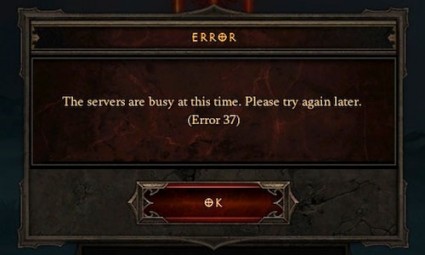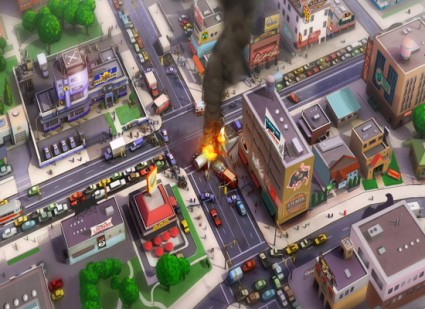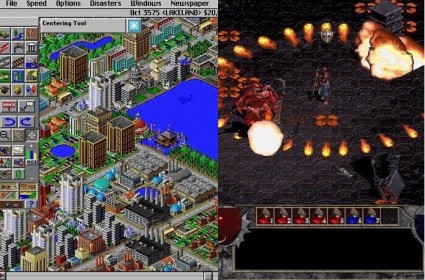Features & News
Team Talk: Always Online DRM
March 27, 2013, Author: Andy Buick
Ready for a huge sigh of relief? The Team Talk feature returns after a long hiatus! This time out we discuss the positives, negatives, possibilities, and likely future of online DRM following the disastrous SimCity launch, and similar problems with Diablo III.
Matt Parker (News Editor)
DRM, for me, is totally needed. Companies pour millions into their software and they need to protect it. However, the principle of it needs to change.
What we have at the moment is nothing more than a barrier, something to stop people playing. DRM needs to be a reward. DRM needs to be something that we willingly participate in.
Look at Steam. It’s essentially DRM, but we all love logging in. Why? Because it works, it rewards us, we trust it and we feel it adds to our experience.
DRM needs to be less ‘harsh stares and questioning at passport control’ and more ‘friendly handshakes and a mojito at a house party’.
I’m now thirsty…
Paddy X (Community Manager)
You would have thought that publishers would have realised by now that this just doesn’t work. God knows the track record speaks for itself, yet they seem adamant that they’re going to make it work if it’s the last thing they do.
Yeah yeah, you can argue the piracy angle, but to my knowledge that’s only truly worked for Diablo III, and from what I understand players had to all but wrestle against it just to enjoy the game; where’s the fun in that? Gamers want to buy a game, and get to playing.
While I can understand the business logic behind such a decision, you’re only shooting yourself in the foot in the long run by alienating the consumers you’re targeting, and how can that ever be a good thing financially?
The more I read about Bungie’s new I.P. Destiny, the more I am intrigued. I have to say they’ve grabbed me right out of the gate and for someone who was not a fan of the Halo franchise (and no doubt should know better), I’m hooked. It’s great news that a subscription model is allegedly not required (although micro-transactions will be no doubt, even if that hasn’t been mentioned yet), it does concern me about the “always on” aspect of it. I have to wonder if Bungie are outreaching themselves here, considering their fervent and loyal fan base, stating that it’s not worried about a SimCity-style server outage when the massive onslaught of players arrive on launch day because it’s dealt with high-demand in the past:
“This isn’t our first rodeo, Bungie is no stranger to anxious mobs of players who rush home after a midnight launch and put our best-laid plans to the test…”
I only hope they’re right, and not allowing arrogance of previous battles won to blind them, for our sakes as well as theirs.
In the ten years or so that this has been floating around in various guises, the success ratio tells you all you need to know, I can’t see that changing any time soon.
I’m off to play a little SimCity to unwind. Oh, wait…

Ah error 37. The good news is you got past 36 other errors, the bad news, you’re not going any further…
Trent Pyro (Staff Writer)
I wrote an article about this a while back, when Ubisoft were hopping about deciding whether to completely remove the always online DRM from their Assassin’s Creed PC versions or leave it in. The presence of the ‘Umbilical DRM’ within Driver San Francisco seemed to echo a decision towards the latter. I pretty much summed up my thoughts there, so here I thought I’d splurge on why I reckon publishers are even trying ideas that are this stupid.
I understand publishers need to do their best to crush piracy, even if it’s just to keep the placard-waving anti-piracy Nazis quiet. I’ve always felt that true piracy stems from a reaction to a bad deal; for example, Activision charging an extra fiver for CoD for no reason. People decide to fuck off the publisher altogether and pirate the game, thereby getting to play it and leave the greedy arseholes in the lurch. Of course, too much piracy would cripple the industry but despite practically every new release popping up on torrent sites weeks before it hits the shelves, millions of copies are still sold and the market seems to be much more affected by the recession than it is by piracy.
Certainly, publishers would like us all to buy a legit copy so they can scrape back those lost pennies but the fact is; it’s more a matter of pride than money. Every company wants to be the first to truly maximise profit and have 100% of copies being played as legitimate copies that they’ve seen every cent from. EA doesn’t need the extra cash; it’s swimming in the stuff. What it does need, however, is a victory; especially after the debacle that kicked off this article. Kind of ironic, really.
Neil Hughes (Site Manager)
When you hand over your hard-earned cash to purchase a game on any format, it should be up to you how and where you decide to play the game in question. To treat your paying customers like shady pirates that you do not trust, is not the best way to win friends and influence people.
There are just too many factors to consider in making this model work; gaming has now become a mobile experience and even the companies behind the next generation consoles recognise this and are investigating ways of continuing your game on your tablet when on the move, like you can with a NetFlix video.
Although we would all love to be permanently online, the real world just isn’t like that yet, and a perfect example would be going on a long haul holiday where gaming helps make the trip seem shorter. A train to the airport would require an expensive Wi-Fi pass, as would waiting around in the airport, not to mention boarding a plane for an 8 hour flight that will be 30,000 feet in the air. Even when you finally get to your destination, should you have to pay for hotel Wi-Fi to play a bloody game that you already own?
Even if your own internet connection is working, you won’t be able to play your game if the servers are experiencing a problem and we have all seen that message at some point during our lives. Publishers and developers don’t want to admit this, but piracy cannot be stopped in the digital world and they should concentrate on looking after their fanbase rather than pissing them off. If they don’t do this, ironically they will lose their customers to the same piracy that they are attempting to stop.

The irony of a car crash in SimCity. Of course if you got as far as seeing anything like this upon release, you were one of the lucky few.
Neil Hickton (Podcast Producer)
It all comes down to how things are implemented. If it’s a great game that everyone wants to play and the copy protection smart arses get ahead of themselves making it nigh on unplayable, you have to ask why? Why do they even need DRM let alone “always online DRM”. I’m sure there are some people that still copy games (somehow) and share them with their friends, but so what?
These guys and girls are not actually making a difference to the money publishers are making. Some might say that this is because of copy protection and DRM being ever-present, but I don’t believe it’s this copy protection that’s doing it. Services like Steam are simply undercutting the “shady guy down the pub”. You know, the one who knows a mate that’s got a copy of ‘Mew Mew Tron online mega blaster‘, “did you want a copy?” The convenience alone beats talking to those dodgy dudes anyway.
I haven’t really talked about always online DRM yet. My feeling on the subject is the company that own the property deserve the right to protect it and their investment. I’m personally indifferent about it; that is until it affects my enjoyment of a game and then I get annoyed so much I think I’ll just go and talk to Mr Shady Dealer so I can play it without all the nonsense. So the message is this; go ahead, protect it, force me to be online if you really have to, but as soon as you have “network connection failed” and this kicks me out or spoils the moment, then well, to incorrectly quote my seven-year old who says “oh fudge” when something “oop” happens… Fudge off.
In a way, always-on DRM could be a misnomer, it’s not really “always”; for instance SimCity gives you a 20 minute grace before your world is over. That could be really annoying if the connection doesn’t pop back up in time to save it, however this is an “always online” game that allows you to be offline, for a while at least.
This leads me to the 3rd world counties (yes you read that right), where they don’t have broadband and can’t be online. Way to go, stupid companies making it impossible for people to play your games. Then of course there are the other places in the world too without internet; they’d want to play FIFA and COD too.

Simpler times
Phil Ubee (Contributor)
To me, personally, always online DRM in itself is not an issue. I actually believe that the concept is fundamentally a good one, one that has its foundations based in good intentions. All gamers want new IPs; we crave them, but by their very nature they are risky business for developers. This means the developers need to ensure they protect their own investments, especially against things like piracy. Always Online DRM in essence is designed for this reason, so should not be an issue or concern for honest gamers.
The problem is that developers always need to ensure that their final product is fun, engaging and above all else; works, which clearly was not the case with SimCity. In that case, the always-on DRM appears to be the cause, so it then becomes a big issue and a major negative against the concept.
There is nothing worse than if a title launches with game-breaking issues, but that consumer pain is doubled if the cause is something that offers nothing to the overall experience. Maybe the way forward with always online DRM is to enable it to do the things the developers want to ensure legitimate copies of the game etc. while also giving something extra to the player. As a massive fan of sports games, I honestly think EA are on their way to achieving this with their new Connected Careers options, which enhance the online experience massively. Now they just need to make it relevant to the players who don’t play online.
Andy Buick (Podcast Co-Host)
Diablo and SimCity. Two huge franchises in the history of the PC, joined in one other very controversial similarity; that of always online DRM. That two such important series should suffer the same massive game-breaking issues at launch is a disaster, and should be a huge embarrassment for all involved. Both were always going to sell by the truckload, and for them to suffer severe server issues from the off is unacceptable, even more so for SimCity given the high-profile problems of Diablo III before it. Had I bought either on release, I would have been livid to find that my hard-earned cash had gone on something I basically couldn’t play.
There is a secondary issue here as well though. The always-on nature of this is really ahead of where we’re at in connectivity terms. I live in a village with a pretty decent broadband connection in fairness, but one that still goes down regularly. For that reason alone I will not buy any game that requires an always-on connection. This situation is no doubt far worse for many people, so the developers are potentially losing sales for what? In fairness, both games have no-doubt sold well despite the DRM, but sales of future games in these franchises must now be a concern, and one which will surely require a change of approach.
Feature Type: Team Talk! | Tagged Always Online DRM, Assassins Creed, COD, Diablo III, Fifa, internet, Online, Sim City, simcity


